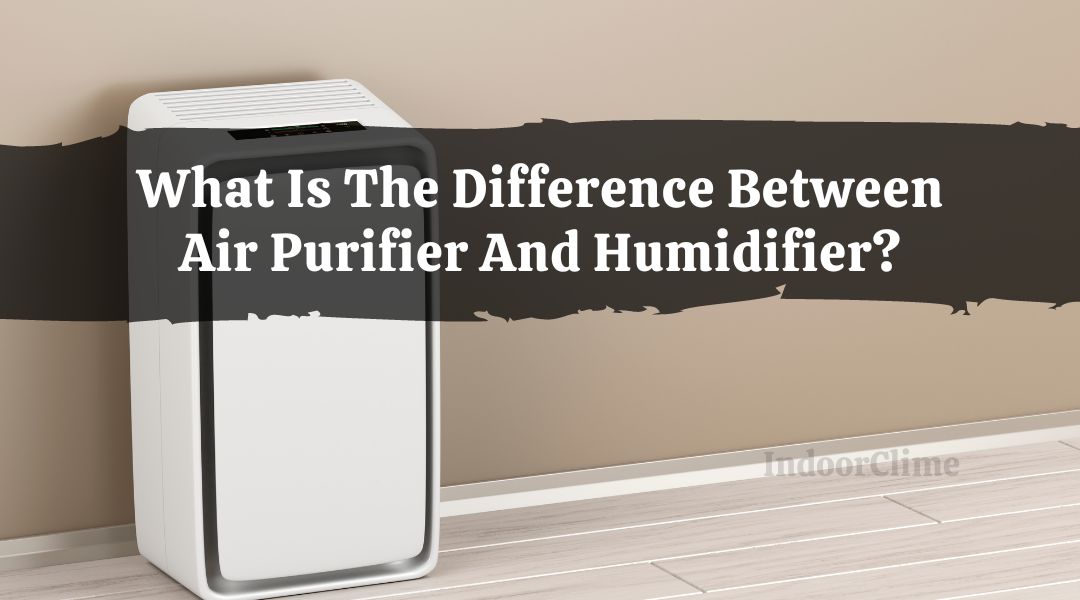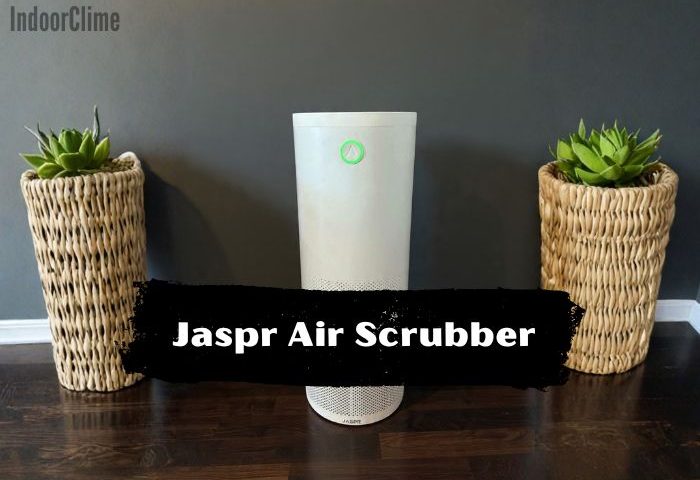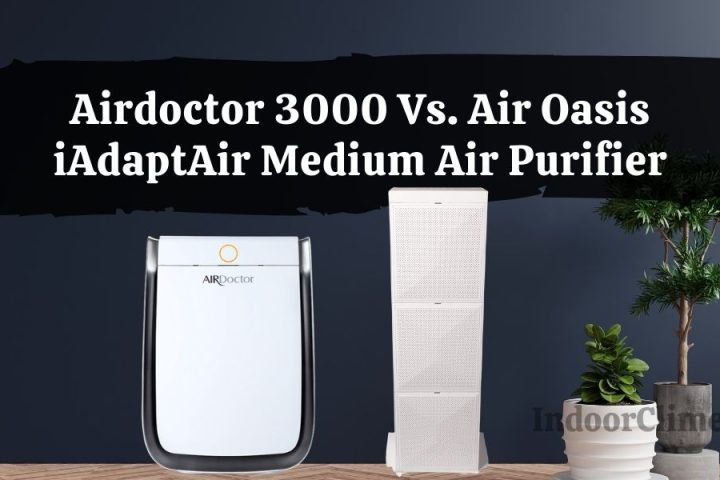Do you want to breathe easier? Of course, a clean atmosphere is essential for your health and comfort, but if you live in a dry climate or have allergies, it can also help with asthma symptoms.
This article will discuss the differences between two types of appliances, Air Purifier Vs. Humidifier. These devices are significant for maintaining a healthy home environment but serve different purposes.
An Air purifier removes dangerous particles from the air, while a humidifier adds moisture to the atmosphere to help prevent dryness and congestion.
If your goal is to remove harmful particles from the air, then an air purifier will work best, while if the intent is to add moisture to dry winter months, then a humidifier may be what you need.
Which one is right for you? Keep reading to find out!
What Is an Air Purifier?

Air Purifier is equipment that cleans the air in your home. Air Purifiers remove pollutants from the air, such as smoke, dust, pollen, and pet dander.
They also reduce odors and improve air quality. Air purifiers are available in both tabletop and floor models. Depending on how much filtration you want, they range from $40 to $500.
When shopping for an Air Purifier, it’s essential to consider the size of your room and how much noise the machine makes.
You also need to determine which type of filter you want. The most common type of filter is a mechanical filter, which traps particles in the air.
What Is a Humidifier?

A Humidifier is a tool that increases the humidity of a room. It is beneficial in dry or cold climates when the air lacks moisture.
Humidifiers come in many models and sizes, but they all add water vapor to the atmosphere. In the United States, humidifiers are used in New York and other areas with cold winters.
Consumers can purchase humidifiers at most home improvement stores or online retailers. They range in price from around $30 to $400, depending on size and features.
Before buying a humidifier, it is essential to consider the needs of the room or space where it will be used.
How Do They Work, And What Do They Do?
Air Purifiers and Humidifiers work to improve your home’s air quality. Your choice will build upon your needs, so research before purchasing. These devices can help make your home a healthier place to live.
What Are They?
Air Purifiers – This device removes contaminants from indoor air, making it a cleaner, more breathable, and healthier living environment. Air purification systems are often found in homes.
Still, they may also include commercial buildings such as offices or schools with less control over ventilation due to open windows or doors.
Humidifiers – These are devices that add humidity to the air. It can be beneficial in dry climates or in winter when the air is dry.
Humidifiers come in various shapes and sizes, from small tabletop models to large floor-standing units.
How Do They Work?
Air purifiers have different types of filters in them. Some even have different filter combinations, including HEPA, ionizers, pre-filters, and carbon-activated filters.
They remove small and large particles and absorb any undesired smells and odors. In addition, they have fans that can create air flows.
Most people assume that air pollution only occurs outside their homes, but this isn’t true: indoor environments contain as many pollutants as outdoor air.
In addition, indoor air can often be more polluted because many of us spend most of our time indoors.
- For babies – If you have young children, an air purifier can help protect them from pollutants that are too small for their lungs to filter out naturally. Removing odors and other contaminants will also keep your home clean and comfortable. Read our guide on the best air purifiers for baby rooms.
- For pets – If you have pets or smoke cigarettes indoors, you’ll need an air purifier to remove massive particles like dust, dander, and smoke. Please read our guide on the best air purifiers for pets.
- For allergies – You’ll want an air purifier with a high CADR rating that can remove small particles from the air, like pollen, dust mites, and pet hair, for asthma or allergies. Please read our guide on the best air purifiers for allergies.
Humidifier – Works by adding water condensation to the air. Some humidifiers have a tank that needs to be filled with water, while others use a filter to absorb moisture from the surrounding environment. The water vapor then enters the room and raises the humidity level.
- Is it possible to over-humidify? Unfortunately, yes! The humidity surface should be between 40% and 60%. If they go above that range, condensation will form on surfaces like walls or ceilings, leading to water damage over time.
- Is it possible to under-humidify? Yes, if you’re using a humidifier that isn’t designed for your home’s size, it might be unable to keep up with the need.
Types of Air Purifiers
- Mechanical Filters are the simplest type of air purifier. They remove large particles from the air, such as dust, pet hair, and pollen. These filters usually have a replaceable filter that needs to be replaced every few months.
- Activated Carbon Filters: effectively remove smaller particles from the air, including smoke and chemical fumes. They work by trapping these particles in the activated carbon filter media.
- Ozone Generators: Ozone generators produce ozone gas, which is then released. Ozone is a powerful corroding agent and can kill bacteria and viruses. It is also effective at removing musk and VOCs from the air.
- Electronic Air Purifiers: Electronic air purifiers use a high-voltage electrical field to ionize particles in the air. It has caused them to clump together, making it easier for mechanical filters to catch them.
Types of Humidifiers
Humidifiers can use evaporative mist with the help of electricity to heat water or ultrasonic waves to create a cool mist. Their sole purpose is to moisten the air and nothing else.
- Evaporative Humidifiers work by drawing water from a reservoir and spraying it.
- Ultrasonic Humidifiers create a fine mist by vibrating water at a high frequency.
Both Evaporative and Ultrasonic Humidifiers have benefits and drawbacks. Evaporative Humidifiers are cheaper but can produce white dust if the filter is not cleaned regularly.
On the other hand, ultrasonic humidifiers are more expensive to purchase, but they are quieter and do not produce dust.
What is the Difference Between an Air Purifier and a Humidifier?

So, the difference between these two units is pretty clear, but people still confuse them and consider air purifiers and humidifiers the same thing.
This section will prove helpful if you are still unsure about the primary differences between the two.
What Purpose Do They Serve?
Air purifiers clean indoor air, and they do so by removing pollutants. These include pollen, dust, mites, smoke, bacteria, viruses, mold, and mildew.
On the other hand, humidifiers moisten indoor air and increase humidity levels. For example, they increase it from 20 percent to 30 percent (normally dry air) to average humidity, 40 percent to 50 percent humidity.
Which Is More Effective In Treating Allergens?
Air purifiers are designed to treat allergens in the air. With more filters, these units can significantly reduce these allergens. This is a fact proven by many studies.
Some studies show that humidifiers are somewhat effective in treating the physical discomforts of dry throat, nose, skin, and lips.
They can help breathe in children and adults with asthma or other allergies, especially during an infection like a cold. But some studies show that humidifiers can worsen allergies and cause skin irritation.
Which Of Them Helps With Asthma?
Some studies suggest air purifiers can help with asthma and best suit adults and children. They clean out any allergens, bacteria, viruses, mold, or mildew from indoor air.
This is something a humidifier cannot do. It can only moisten the air, and some allergens like bacteria and mold can grow even more with moisture. Therefore, not many studies recommend using humidifiers for asthma.
Which Of Them Cleans the Air Out Of Pollutants?
As mentioned above, air purifiers are the units that clean out air from pollutants. They have various filters that can trap contaminants and throw out clean air for you to breathe.
This is something that a humidifier cannot do as its basic purpose is to moisten the air, and that’s it. These units have water tanks, and they either use ultrasonic technology or a wick and a fan to convert this water into steam and throw it out into the air.
As a result, the humidity level in the indoor air increases. There is nothing that it can do to clean out the air.
What Is the Perfect Season To Use Them?
Air purifiers are there to clean out the air. You can use them throughout the year, regardless of the season.
But the same cannot be said for humidifiers. These units are more functional during the seasons of dryness when there is no humidity.
It means that you need to use them during the winter season. This is because humidity levels are high during summer, fall, and spring. So, they are only effective during the winter season.
So, the best time to use air purifiers is when your indoor air quality is low. And the best time to use humidifiers is when your indoor humidity levels are low.
How Much Do They Cost?
There are different types of air purifiers available on the market. It is primarily due to the different filters they have in them. However, they have also recently seen plenty of research and development, so they have a higher price tag.
Humidifiers have also become quite advanced, but their working process is simpler. So, they will have a smaller price tag than air purifiers.
How Do Air Purifiers and Humidifiers Affect Your Health?

Air Purifiers have also been shown to reduce the risk of asthma symptoms in children by up to 90 percent when used regularly; this benefits anyone with asthma or sensitive airways because fewer dust particles will be circulating in their house.
They are especially favorable to those with allergies, asthma, or other respiratory conditions.
Humidifiers are also used for many health and home benefits and plants. For example, humidifiers can be good for you because it helps keep your skin moist and prevent drying out.
When your skin gets dry, you can get cracks which may cause pain or bleeding. It is especially true for people who live in dry climates such as the Southwest United States, where there are deserts with little to no moisture at all times except summer months when rainfall may occur more frequently (and even then, it may not be enough).
Which Is Better For You: An Air Purifier or Humidifier?
It depends on what type of environment you live in and how much moisture is outside the house.
If it’s dried all year round like Arizona, then probably go with an Air Purification System because they add water into the indoor atmosphere while removing pollutants!
On the other hand, if they live in massive humidity levels like in Florida, using both might help balance things out, but we only need one.
Since our climate doesn’t change much throughout the year, an Air Purification System would be sufficient to keep everything fresh inside our homes.
Which One Is Right For You?
For example, an air purifier may be better if you have an allergic reaction or respiratory problems because it can help with these issues. On the other hand, if your only concern is the cold winter months, a humidifier will work great without harming anyone’s health.
If you are still uncertain whether an air purifier or Humidifier is best for you, here are some benefits of each that might help make your decision –
Humidifiers add moisture to the air, which can help relieve dry skin, sinuses, and chapped lips. They also benefit people with asthma by moistening the airways and reducing lung inflammation. At the same time, Air purifiers remove harmful particles, such as smoke or dust mites.
Finally, they are beneficial if you suffer from allergies or asthma because they can reduce symptoms by removing triggers that cause flare-ups, like pollen or pet dander.
Advantages Of an Air Purifier

Relieving Asthma Symptoms
As per CDCP, every 1 in 12 individuals has asthma. People with asthma need clean air to breathe. The air should not contain dander, pollen, dust mites, or bacteria.
These are the pollutants that cause difficulty in breathing. And air purifiers can filter out these pollutants to provide clean air, thanks to their multiple filters.
Eliminating Harmful Chemicals
According to the NLM, various gasses are present in our household, and we don’t even notice them. Nitrogen dioxide and carbon monoxide are most commonly present in our homes, and we breathe in them.
Exposure to these harmful gasses can be unhealthy. But air purifiers can filter them out and make your indoor air clean.
Neutralizing Odors
Various chemicals break down at room temperature. As a result, they began to off-gas, which can be an unpleasant experience. These chemicals include formaldehyde, benzene, and gasoline.
Such chemicals have volatile organic compounds, which influence your cognitive functions. These chemicals release odors and air purifiers can neutralize them.
Reducing Chances Of Airborne Diseases
Any airborne diseases like flu and the common cold are spread with those tiny pathogens that float around in the air.
When only one family member catches the flu, it is common for everyone else in the house to catch a cold too. These air purifiers can reduce these airborne diseases pretty effectively.
Improving Sleep
Indoor allergens like fungi, dust mites, and bacteria can trigger hay fever and allergies. These allergies can cause coughing, sneezing, watery eyes, nose congestion, sore throat, etc.
And these conditions can disrupt your sleep. When you have an air purifier, you won’t have to deal with these conditions and will enjoy a good night’s sleep.
Increasing Life Expectancy
Air purifiers can increase your life expectancy. Breathing in those pollutants over time can significantly impact your health in the long run.
Air purifiers can remove those pollutants, and you will have to deal with these pollutants, much less indoors. It will allow you to live a healthier life.
Advantages of a Humidifier

Preventing Influenza
According to a study, these humidifiers can reduce flu-related risks. Humidifiers can increase humidity levels, deactivate virus particles, and prevent spreading. So, they are pretty effective in preventing influenza.
Making Your Cough Productive
A productive cough can release any sticky or trapped phlegm. Conversely, dry air can cause dryness, resulting in an unproductive cough.
With moisture in the air, you won’t have to deal with a sore throat and dry cough and feel more comfortable.
Reducing Snoring
Thanks to a humidifier, snoring can be significantly reduced with more moisture in the air.
With dry air, your air passages will be less lubricated, and it causes snoring. So, humidifiers can help in reducing snoring.
I Am Keeping The Hair And Skin Moist.
You might notice that your skin, lips, and hair tend to become more fragile and dry during winter.
It is because many heating systems are throwing out hot air. With a humidifier, you can prevent that from happening.
Is An Air Purifier Same As A Humidifier?
No, air purifiers are entirely different compared to humidifiers. They serve other purposes, and they also have different mechanisms. Air purifiers are designed to purify the air and remove any pollutants. In comparison, a humidifier is designed to moisten the air.
You can use air purifiers throughout the year in any season. But humidifiers only come in handy during dry winters. In addition, air purifiers are more complicated in design, with multiple filters to clean the air, so they also have a higher price tag.
People Also Ask
Which is the best air purifier or humidifier?
They both serve different purposes. Air purifiers filter out any pollutants in the air, and humidifiers are used to moisten the air.
And as they both are designed to achieve two completely different goals that cannot overlap. You can use them in conjunction, and one can replace the other.
Can an air purifier also be a humidifier?
They are different, but some modern manufacturers have combined them into a single unit. For example, Afloia has an air purifier with an inbuilt humidifier.
Another good example is the Sharp Air Purifier + Humidifier Combo. There are various other options that you can try because these combo units are pretty popular these days.
Can you use an Air Purifier and Humidifier together?
The answer to this question is yes. You can customize an Air Purifier and Humidifier together.
Many people choose to do this because it can help improve the air quality in their homes.
Humidifiers add mist to the air, which helps reduce dryness, while air purifiers remove allergens and pollutants from circulating in your home.
Steps in using Air Purifier and Humidifier Together
You need to connect the two devices to the same outlet. Most Humidifiers come with a built-in adapter that will fit most standard AC outlets, while some air purifiers also have an adapter for connecting to a humidifier.
Once connected, set the humidity level on your Humidifier to 50% or higher and the fan speed on your Air Purifier to low or medium. You should also run both devices for at least four hours daily to achieve the best results.
Is a Humidifier or Air Purifier Better for Allergies?
Unfortunately, there is no definitive answer for which appliance is better for allergies. However, these two have advantages and disadvantages that can make them more or less effective depending on their needs.
Some people find that using a Humidifier helps relieve congestion and other allergy symptoms.
In contrast, others find that an air purifier cleans the air more effectively and helps to reduce allergic reactions. The best way to determine which appliance is better for you is to try one and the other to see which works better for your situation.
Does the usage of air purifiers or humidifiers help with Eczema?
Although very little scientific evidence proves that air purifiers and humidifiers help with eczema, people have reported immense relief from their use.
Any indoor pollutants can trigger and worsen conditions like eczema or neurosis. Air purifiers work wonders in removing even the tiniest contaminants very efficiently.
This helps people with eczema or atopic dermatitis. But it is an entirely wrong conception that humidifiers help clean the sir. No. Humidifiers are not designed to improve air quality or trap pollutants.
They only regulate the moisture levels inside a room. Long story short, humidifiers do not help relieve eczema, although air purifiers can benefit eczema patients.





